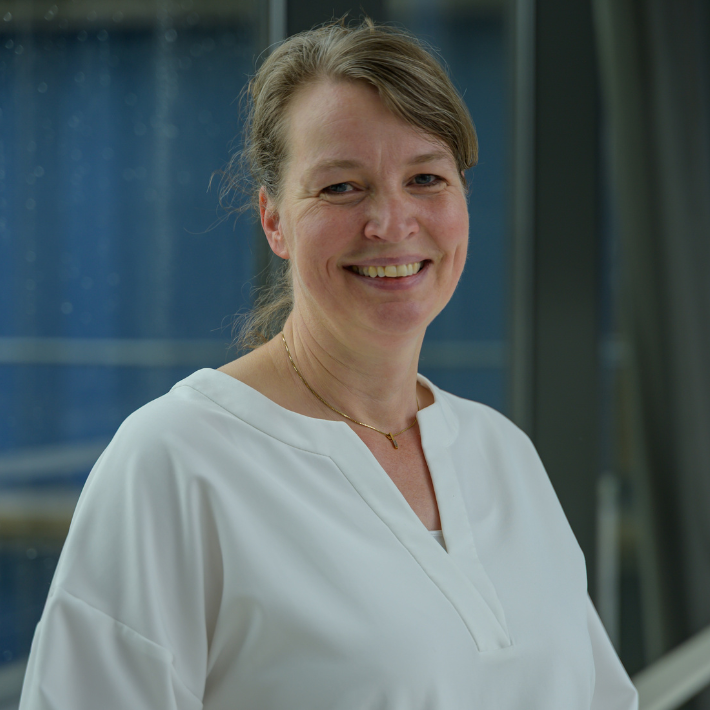Janneke de Man-van Ginkel appointed professor of Nursing Science
&width=710&height=710)
Do individual nurses provide the same care to patients?
De Man-van Ginkel focuses her research on essential nursing care within a multidisciplinary context, throughout the entire patient’s care pathway, aiming to enable patients, despite illness or limitations, to continue to actively participate in society or to die with dignity.
Within this broad framework, she pays specific attention to continuity of care. Previous research has shown that this continuity include three aspects: information continuity, management continuity, and relational continuity between patient and healthcare professional.
De Man-van Ginkel: “I would like to add a fourth aspect to this, namely continuity in the content of care. The question is whether individual nurses provide the same care to a patient. Do they follow the available evidence and agreements made, or their personal opinions and preferences?” According to her, consistency in care is important for the effectiveness of nursing interventions, which are often complex and consist of multiple components that require specific skills and behavior from both the patient and the healthcare provider. That is why she also investigates the characteristics of different patient groups, their needs and preferences, as well as the perceptions of healthcare professionals.
Nursing is a comprehensive field
According to De Man-van Ginkel, the nursing profession is comprehensive and encompasses all stages of life, from birth to death. Nursing care is provided in a variety of care settings, such as hospital wards, outpatient clinics, home care, rehabilitation centers, and residential care facilities. The profession is diverse and consists of professionals with different levels of education and backgrounds, ranging from nursing assistants to professors.
This diversity means that chairs in Nursing Science often have a broad field of study, especially if it is the first chair in an organization. According to De Man-van Ginkel, this is in line with the field. “Many aspects of nursing care are not determined solely by the disease itself,” she says. "Care is also determined by the consequences of a disease for people's physical, psychological, and social functioning. As a result, from a perspective of nursing care, there are many similarities between different diseases. This means that a single chair in Nursing Science can be relevant to a wide range of the field. Nevertheless, it is not possible to serve the entire field with a single chair. It is therefore positive that the number of chairs in Nursing Science in the Netherlands has increased significantly in recent years."
Nursing science research is of great importance to society: continuity of care
Nursing science research is of great importance, not only for the nursing field itself but also for society. Increasing knowledge about diseases and treatment options has led to greater specialization in healthcare. Although this is valuable given the demographic developments that result in decreasing demand for increasingly complex care, it also leads to fragmentation of care. At the same time, the availability of care is under pressure due to a shortage of healthcare professionals, especially in nursing. This is directly related to the central theme of De Man-van Ginkel's chair: continuity of care.
Joining forces and working together on future-proof healthcare
A flexible, agile nursing profession is crucial for future-proof healthcare. Nurses needs to be able to take leadership to meet the growing demand for high-quality care with the same number of professionals. This requires the ability to advocate for the nursing profession within interprofessional collaboration and in the public domain.
This calls for research that scientifically substantiates the nursing profession, but also good education in both vocational training and continuing education, including at academic level. De Man-van Ginkel: “That's why I teach in the Master's program in Nursing Science in Utrecht and work with other professors in nursing science on a long-term vision for scientific master's education.” She emphasizes that more academically qualified nurses are needed to properly represent the interests of the profession in discussions about future care.
Integration of research and education in nursing care
To achieve this, integration of research and education into nursing practice is essential. That is why De Man-van Ginkel's chair also focuses on the academization of nursing. She believes that care, research, and education must be closely linked. New nursing positions are being introduced at the LUMC that combine these roles, such as that of nurse scientist. In this position, an academically educated nurse provides bedside care while simultaneously conducting scientific research under the supervision of the chair. This offers nurses the opportunity to build a scientific career as nursing care professional and thus contribute to continuous knowledge development, leading to better outcomes for patients.
This approach fits seamlessly with the LUMC's mission: to contribute as an innovator to the improvement of healthcare and people's health through leading-edge research and innovative education, with the aim of providing the best possible care for patients.
Resume
Janneke de Man-van Ginkel is a registered nurse, nursing scientist, and clinical epidemiologist. She has over ten years of experience as a neuroscience nurse and nurse practitioner, and is an expert in complex nursing care for patients with acute conditions that have long-term consequences for physical and psychosocial functioning.
She obtained her master's degree in Nursing Science in 2008, completed her postgraduate master's degree in Epidemiology in 2011, and obtained her PhD in 2012. She then continued at UMC Utrecht as an assistant professor and, from 2019, as an associate professor. From 2014 to 2022, she was program coordinator of the master's program Nursing Science at Utrecht University. In March 2022, she made the switch to LUMC.
She is also chair of the supervisory board of a long-term care organization and a member of the board of the European Academy of Nursing Science.
